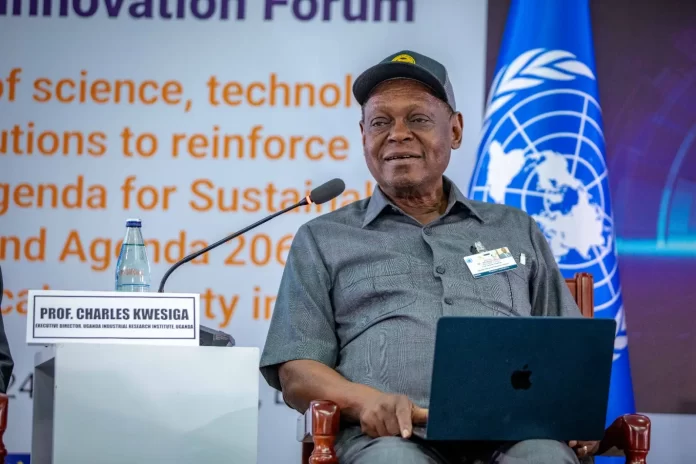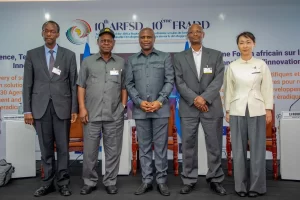
Advising that each African country faces unique challenges that demand unique technological solutions, the Chief Executive of the Uganda Industrial Research Institute (UIRI), Prof. Charles Kwesiga, has advised that developing countries must do a precise assessment of their economic feasibility before procuring high-tech machines in order to meet their needs.
Kwesiga said that international salesmen are more concerned about their sale commissions and not the success of African projects. He emphasized that it is time for Africans to always pick appropriate technologies that will ensure projects in Africa take off to sustainable standards.
The professor made these remarks on April 22, 2024, at the Sixth Africa Science, Technology, and Innovation Forum (ARSTIF), which took place in Addis Ababa, Ethiopia, where he is a panelist.
The panel, which was composed of Dr. Yonus Gizaw from UN-Green Chemicals and Prof. Ndirangu Kioni from Dedan Kimathi University, Kenya, among others, focused on concrete ways in which African countries can acquire and use global knowledge to meet the sustainable development goals of overcoming poverty and hunger.

Kwesiga called for the enforcement of the concept of cooperation, integration, and exchange of ideas as means for African countries to design lasting solutions to technological needs.
While appearing on the panel, Prof. Kioni, the head of Research, Innovation, Ecosystems, and Entrepreneurship Education at Dedan Kimathi University, Kenya, said that they are benchmarking Uganda’s UIRI facility to acquire knowledge of applied technology for sustainable development as a means of working together.
He said that the move is meant to strengthen partnerships with the goal of closing gaps between technology beneficiaries and technology innovators of high-level scientific knowledge with the aim of addressing common personal problems.
Prof. Kwesiga is on Tuesday, April 23, 2024, participating in the Tenth Africa Regional Forum on Sustainable Development (ARFSD-10), which will convene high-level policymakers and experts from ministries and agencies responsible for finance and economic development, social affairs, environment and natural resources and management, statistics, agriculture and food security, science, technology, and innovation.
While at the Tenth Africa Regional Forum on Sustainable Development, Kwesiga will be representing Uganda, focusing his deliberations on science, technology, and innovation, an area UIRI has built a reputation in.
As one of its objectives, the forum will strengthen learning and advocate for effective policy measures and actions at the national, regional, and global levels with the aim of advancing the implementation of the SDGs and goals of Agenda 2063.
The Sixth ARSTIF is convened once a year to discuss science, technology, and innovation cooperation around thematic areas for the implementation of the Sustainable Development Goals, congregating all relevant stakeholders to actively contribute in their area of expertise.
This year’s forum focused on effective delivery of science, technology, and innovation solutions to reinforce the 2030 Agenda for Sustainable Development and Agenda 2063 and eradicate poverty in Africa, with specific attention to Goal 1 (Poverty), Goal 2 (Hunger), Goal 13 (Climate Change), Goal 16 (Peace, Justice, and Strong Institutions), and Goal 17 (Partnership for the Goals) and the corresponding goals of Agenda 2063.














